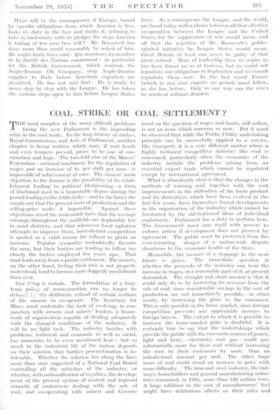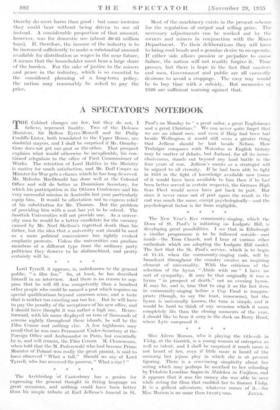COAL STRIKE OR COAL SETTLEMENT ?
THE most complex of the many dffi
icult problems
facing the new Parliament is the impending crisis in the coal trade. To the long history of strikes, Royal Commissions, and Acts of Parliament, another chapter is being written which may, if cool heads and even tempers prevail, prove to be one of con- struction and hope. The two-fold aim of the Miners' Federation—national machinery for the regulation of wages and an increase of 2s. per shift per man—is impossible of achievement at once. The owners' main objection .to the former is the possibility of its estab- lishment leading to political bludgeoning—n form of blackmail used 'to a lamentable degree during the period leading to the 1926 strike—and to the latter the simple one that the present costs of production and the selling-price make it impossible. Against these objections stand the undeniable facts that the average earnings throughout the coalfields are deplorably low in most districts, and that whenever local agitation. attempts to improve them, inter-district competition is quoted as a valid reason for refusal to grant an increase. Popular sympathy undoubtedly favours the men, but their leaders arc tending to follow too Closely the tactics employed ten years ago. That road leads away from a pacific settlement. The owners, on the other band, feeling their case is not properly 'understood, tend to become more doggedly recalcitrant than ever.
One thing is certain. The formulation, of a long- term policy of reconstruction can no longer be delayeLT Ly the deliberate refusal of certain sections • of the owners to co-operate. The Secretary for Mines must undertake the task of evolving, in con- junction with owners and miners' leaders, a frame-. Work of organisation capable of dealing adequately with the changed conditions of the industry. It will be no light task. The industry bristles with problems, ,teehnical and economic as. well as social, too numerous to be even mentioned here : but so much in the industrial life of the nation depends on their solution that further procrastination is in- tolerable. Whether the solution lies along the lines more than once suggested of a National Coal Board controlling all the activities of the industry, or whether, with nationalisation of royalties, the develop- ment of the present system of central and regional councils of • coalowners dealing with the sale of coal, and co-operating with miners and Govern-
ment on the question of wages and hours, will suffice, is not an issue which concerns us now. But it must be observed that while the Public Utility undertaking principle can be successfully applied to a service; like transport, it is a very different matter where a highly technical competitive industry like coal is concerned, particularly when the economics of the industry include the problems' arising from an essential export trade which cannot be regulated except by international agreement.
What is abundantly clear is that the changes in the methods of winning coal, together with the vast improvements in the utilisation of the basic product and its derivatives which have been evolved in the last few years, have themSelves forced developments in the organisation of the industry which cannot be frustrated by the old-fashioned ideas Of individual coalowners. Parliament has a duty to perform here.
The Government must arm itself with powers to enforce action if development does not proceed by agreement. The public must be protected from the ever-recurring danger of a nation-wide dispute disastrous to the economic health of the State.
Meanwhile, the menace of a stoppage in the near future is grave. The immediate question is
whether the proceeds of the industry can bear the increase in wages, or a reasonable part of it, at present. demanded. The straight and short answer is that it
could only do so by increasing its revenue from the
Sale of coal, since considerable savings in the cost of production . are not immediately possible,—in other
words, by increasing the price to the consumer., This is only possible in the home market, since foreign competition prevents any appreciable increase to foreign buyers. The extent to which it is possible to increase the home-market price • is doubtful. It is certainly true to say that the undertakings which provide the public with the two main sources of power, light and heat, —electricity and gas —could pay substantially more for their coal 'without increasing the cost to their customers by more than an infinitesimal amount per unit. The other large - users of coal could stand an increase in price with more difficulty. The iron and steel industry, the rail- ways, houscholderS and general manufacturing induS- We§ consumed, in 1984, more than 120 million tons. A large addition to the cost of manufacturers' fuel might have deleterious effects on their sales and
thereby do more harm than good : but some increase they could .beat without being' driven to use oil instead. A considerable proportion of that amount, however, was for domestic use (about 80-35 million tons). If, therefore, the income of the industry is to be increased sufficiently to make a substantial amount available for distribution as wages in the near future, it means that the householder must bear a large share of the burden. For the sake of justice to the miners and peace in the industry, which is so essential to the considered planning of a long-term policy, the nation may reasonably be asked to pay the price. Most of the machinery exists in the present scheme for the regulation. of, output' and selling price. The necessary adjustments can be worked out by the owners and miners in conjunction with the Mines Department. To their deliberations they will have to bring cool heads and a genuine desire to co-operate. If either side allows .passion or prejudice to cause' failure, the nation will not readily forgive it. Time presses, but there is hope in the fact that masters and men, Government and public arc all earnestly desirOus to avoid a stoppage. The easy .way would be to buy time with a subsidy.. But memories of 1926 are sufficient warning against that.













































 Previous page
Previous page